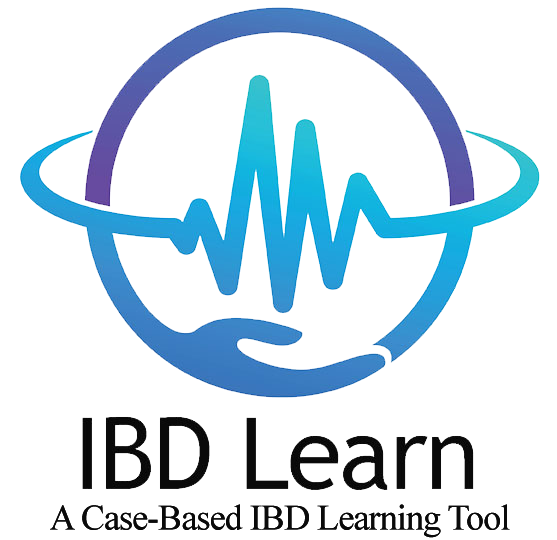Case 18 Discussion
*Please don’t forget to answer the post case question after this discussion*
**Stay tuned next month for further management pearls and complications of Short Bowel Syndrome and Intestinal Failure!**
Learning Objectives:
- Define intestinal failure and underlying causes.
- Review the physiology of nutrient absorption in the intestine.
- Identify treatments for diarrhea and malabsorption in patients with intestinal failure.
IBD EPAs
- EPA 4: Manage adverse events and complications of IBD and IBD therapies
- EPA 6: Manage preoperative and postoperative care for patients with IBD
- EPA 9: Evaluate and manage nutritional health status in patients with IBD
The 5 major risk factors for increased mortality in patients with short bowel syndrome include: end jejunostomy, primary reason for SBS being mesenteric arterial infarction, history of cancer, age > 60 years, and permanently dependent on total parenteral nutrition (TPN). Conversely, ffactors associated with reversal and thus not needing TPN include, more than 35 cm small bowel with jejuno–ilealanastomosis, intact IC valve and colon in continuity, greater than 60 cm of small bowel with jejuno–colic anastomosis, healthy remaining bowel bowel is healthy, adaptive hyperphagia, minimizing intestinal fluid and electrolyte losses, use of an Intestinal rehabilitation center.
Management of diarrhea in patients with SBS is similar to those with chronic diarrhea from other etiologies. In patients with CD, assess their disease activity when faced with new or changing diarrhea symptoms, and optimize their Crohn’s therapy if disease activity is present. Assessment for alternate etiologies of diarrhea should be performed, including infection, celiac disease, microscopic colitis, pancreatic insufficiency.
Treatments may be tailored for those with SBS:
- Diet therapy – increasing oral soluble fiber may reduce transit time and solidify stool. Reduce oral intake of simple sugars particularly sugar sweetened beverages.
- Anti-diarrheal therapy – options include loperamide, diphenoxylate/atropine, tincture of opium, and octreotide. All work best when taken 30 minutes before a meal
- Clonidine – in a small unblinded study of patients with SBS dependent on PS with refractory diarrhea, clonidine delivered transdermally resulted in a 9% reduction in fecal weight, translating to a reduction in stool output of 3L per week.
- Choloretic diarrhea – trial of bile acid binding resins if < 100 cm of distal ileum were removed. Take care that fat malabsorption does not occur.
- Gastric hypersecretion –proton-pump inhibitors and histamine-2 receptor blockers may reduce gastric hypersecretion, and slow down transit
- SIBO – patients with SBS are at high risk of SIBO, which can worsen fat malabsorption and thus cause steatorrhea. Treating SIBO with antibiotics +/- probiotics can be helpful.
- Fat malabsorption – may be treated with a trial of pancreatic enzyme replacement.
References
- Pironi L. Definitions of intestinal failure and the short bowel syndrome. Best Pract Res Clin Gastroenterol. 2016 Apr;30(2):173-85. doi: 10.1016/j.bpg.2016.02.011. PMID: 27086884.
- Amiot A, Messing B, Corcos O, Panis Y, Joly F. Determinants of home parenteral nutrition dependence and survival of 268 patients with non-malignant short bowel syndrome. Clin Nutr. 2013 Jun;32(3):368-74. doi: 10.1016/j.clnu.2012.08.007. Epub 2012 Aug 23. PMID: 22992308.
- Buchman AL, Fryer J, Wallin A, Ahn CW, Polensky S, Zaremba K. “Clonidine reduces diarrhea and sodium loss in patients with proximal jejunostomy: a controlled study.” Journal of Parenteral and Enteral Nutrition, 2006;30:487–491.
